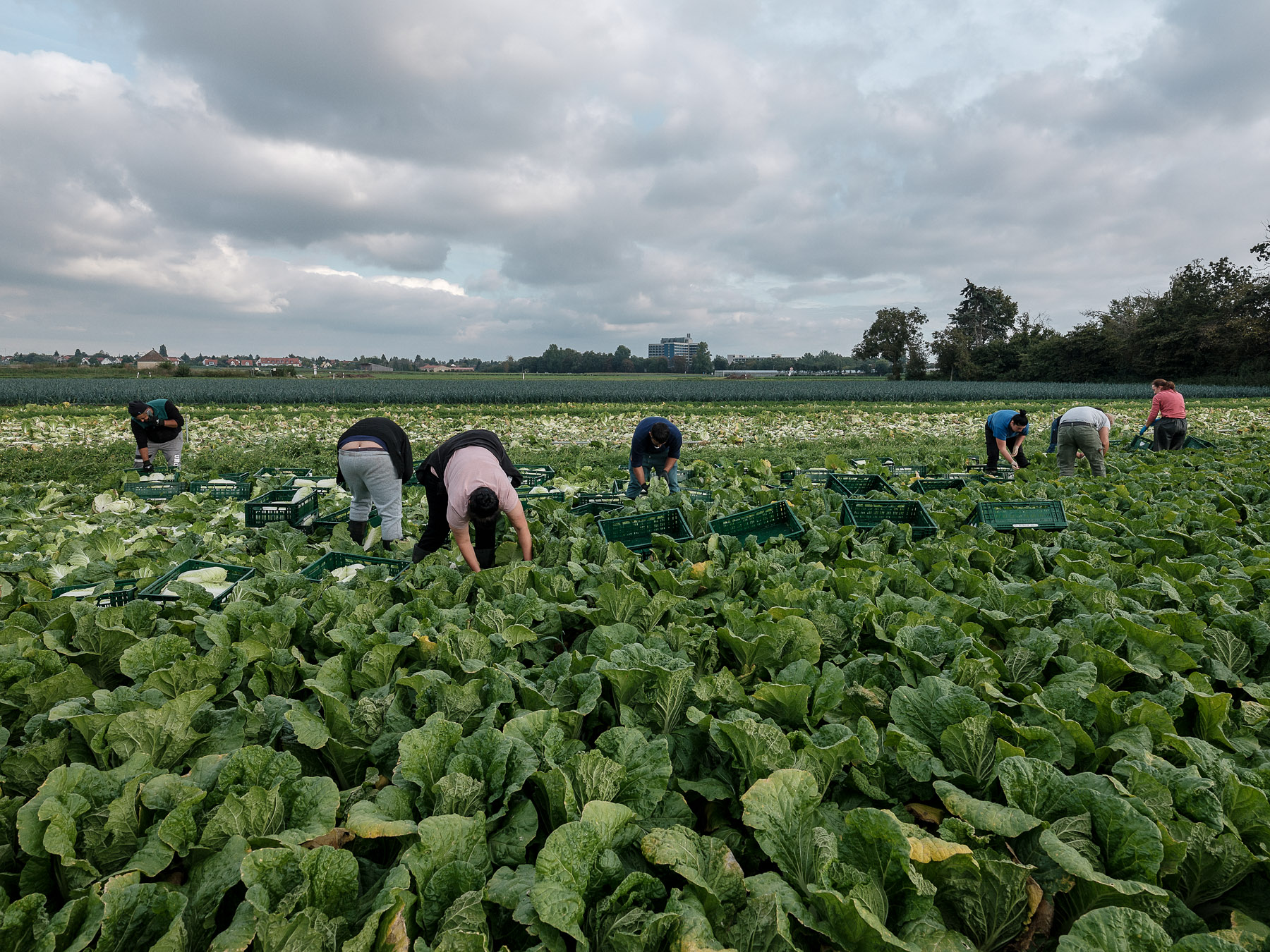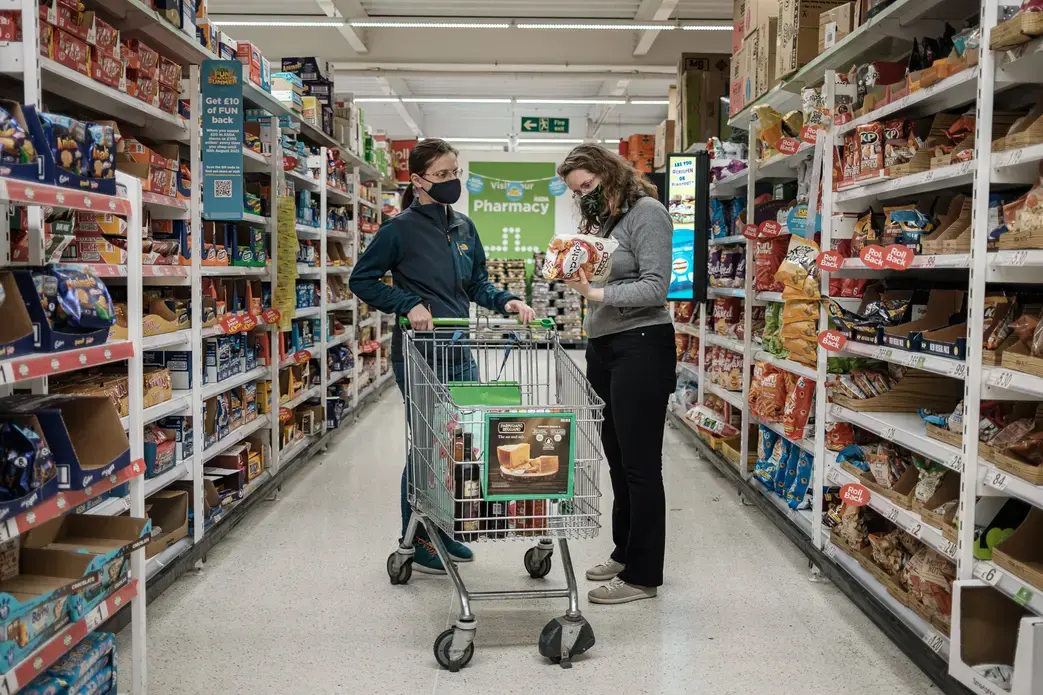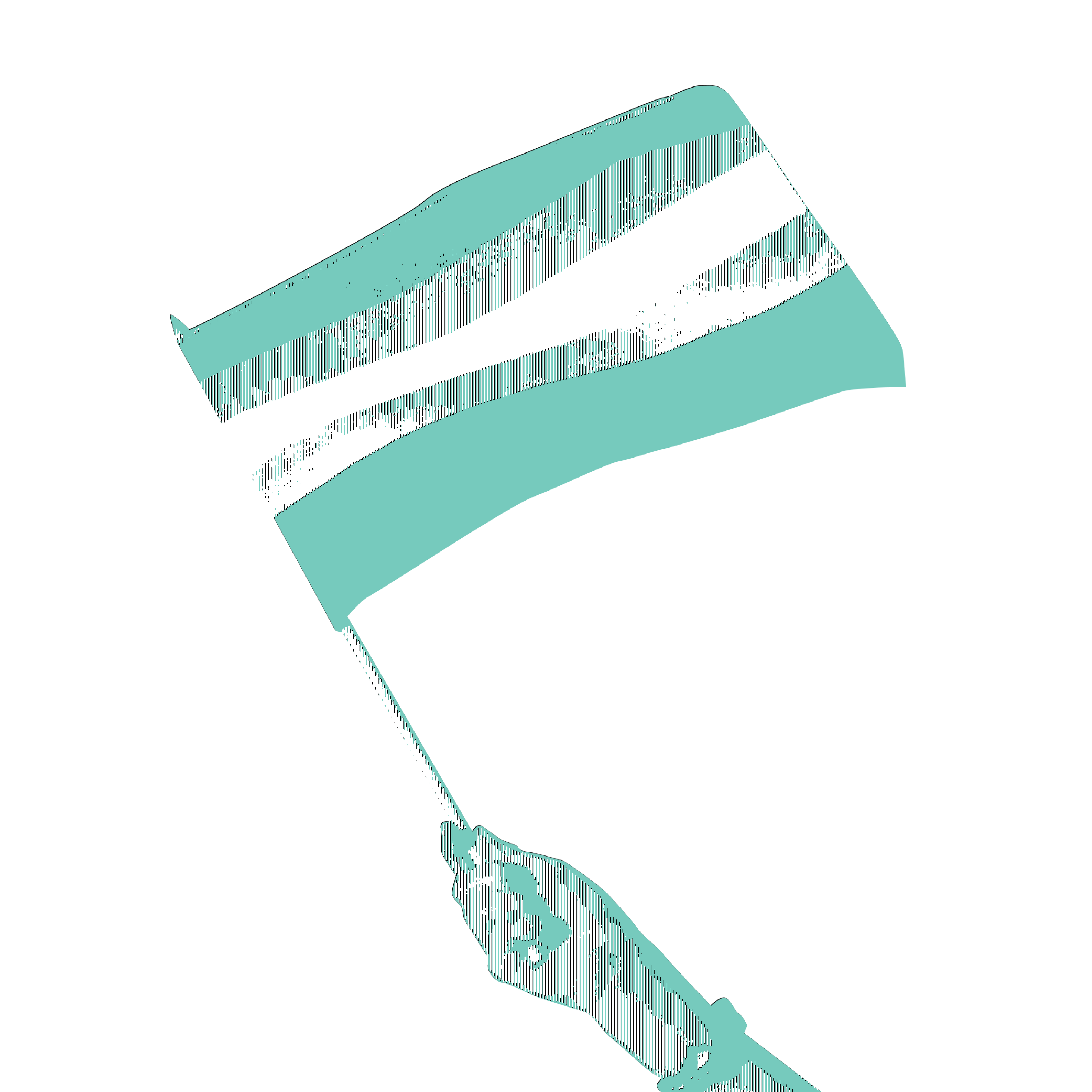Sunday mornings at Tamworth are lazy. It’s 15°C outside and it’s been raining for the past few days, even though it’s August. Ella and Crina have grown accustomed to British weather and are looking up the weather in Bucharest online: It’s 40 degrees there.
Ella is making breakfast (sandwiches with fried eggs) and a second batch of coffee. She shows me her favourite cup, which she got from her work colleagues in Birmingham, and has the caption "Keep Calm I’m a Lesbian."
Usually, they would spend their Sunday working on the renovations, but the end of our quarantine period is a great opportunity for us to take a stroll around Tamworth.

As a nonprofit journalism organization, we depend on your support to fund more than 170 reporting projects every year on critical global and local issues. Donate any amount today to become a Pulitzer Center Champion and receive exclusive benefits!
Ever since they moved to England two and a half years ago, the pace of their lives has quickened. First, they rented an apartment in Sutton Coldfield, a suburb of Birmingham, and Ella started a job in a new field. They got married on April 25th 2019, sold their apartment in Bucharest, got a loan, bought the house in Tamworth, moved in and started renovations. Then the lockdown started and they didn’t have any opportunity to get to know their neighbours or the city a little bit better.
We’re walking in the park around Tamworth Castle, Ella and Crina holding hands in a gesture that has much more significance for them than passers-by might imagine. "I was shocked when I first arrived at Birmingham train station and there were rainbows everywhere," Crina tells us. "In Romania, if you put up a rainbow somewhere, you’ll cause a ruckus for making homosexual propaganda."
We also noticed the rainbow banners and flags in Birmingham, as well as various rainbow-coloured street furniture. We took our picture in front of the Forward Together monument in Victoria Square, which contains 25 steel silhouettes of real people of diverse ethnicities and sexual orientations.
It is a bit ironic for us to be admiring the openness and drive for inclusion of a society that voted to leave the European Union, one of the most important reasons being the fear of immigrants. But the truth is that the differences between Romania and the United Kingdom (which has allowed same-sex marriage since 2014) are huge. The traumas of the authoritarian communist regime and of the poverty Romania went through in the transition period did not create an adequate environment for a culture of inclusivity. Quite the contrary.
‘They were talking about our very lives’
90% of Romanians say they are Orthodox, and the Romanian Orthodox Church exerts a huge influence on politics in the country. The Church has managed to quash any initiative concerning the legal recognition of gay couples in the past few years.
In 2015, three million Romanians signed for a citizen’s initiative that requested to amend the Constitution of Romania so that it explicitly stated that marriage is only between a man and a woman. Orthodox, Catholic, and Neo-Protestant volunteers, as well as other religious associations, were all actively involved in gathering the required number of signatures to trigger a referendum.
In May 2016, the signatures were registered in Parliament alongside a draft bill to amend the Constitution. Civil society organisations denounced this initiative as "having no legislative impact" (since there was already no recognition for same-sex couples), with the sole effect of further stigmatising LGBTI persons in Romania.
This is exactly what happened in the ensuing two years until the referendum was organised on October 6th and 7th, 2018. For instance, illegal banners were set up in various cities, such as the one in Timișoara that said that if you don’t vote in the referendum, the gays will steal your children; propaganda material bearing similar messages was distributed in schools; and priests talked in their parishes about "the homosexual illness."
"They were talking about our very lives," says Crina. "I’m disgusted by politicians that throw your life in the gutter just so they can gain some votes."
"They needed to find a common enemy," says Ella. "They found a group that was weak and couldn’t rally together, because they were scared. The perfect victim. When you’re so used to hiding all the time, exposing yourself in order to represent yourself takes a lot of bravery."
Ultimately, the referendum was boycotted and only 21.1% of the population voted, whereas the minimum attendance threshold for validating it was 30%. Many have since said that this failure did not actually mean Romanians were more open to the LGBTI community, but that it was a protest action against the PSD (the party in government at the time), which organised the referendum in order to divert attention from the legal changes they were trying to implement in the justice system.
Specifically, the PSD was trying to amend the law that governed pardons and the Criminal Code in favour of their party members that had criminal files. This led to the anti-corruption protests that shook Romania between 2017 and 2019, when hundreds of thousands of Romanians protested. Crina and Ella were among them, dressed in ski trousers in the bitter -15°C cold, holding up signs that said things like: "Mobsters in Parliament," "Careful, conmen on the loose," "No more criminals, down with the government," or "The coalition is attacking our justice system."
‘I was worried about the wellbeing of my partner in case something happened to me’
"Before we left the country, Romania was at a boiling point," says Ella. "We were all there [at the protests] and it was like you were ashamed to say you wanted to leave the country and abandon everyone else in the trenches."
"At times you could feel the sheer anger, desperation and desire for change everywhere around you," says Crina. "When you saw all those people around you, it nurtured the hope that change was truly possible."
However, their relationship was not legally recognised, nor was there any hope for this to happen during their lifetimes. Their apartment was owned solely by Crina. When she decided to draw up her will, she found out her relatives would receive part of her inheritance anyway, despite any wishes to the contrary by the deceased, because the law in Romania provides for a reserved portion of the estate.
"I was worried about the wellbeing of my partner in case something happened to me — really unpleasant things to think about when you’re 30," says Crina. "Not to mention we could not decide anything for each other in case one of us fell ill. There are many things you share only with your partner, things your parents might not know about, yet the law in Romania only gives your parents the power to decide in these situations."
A 2021 report by ACCEPT (a Romanian association that defends LGBTI rights), drafted in partnership with the Council of Europe, highlights that Romania denies homosexual families a series of basic rights: the right to decide for each other in a medical situation, the right to common ownership of assets, the right of inheritance, the right for the partner to be co-insured within the public healthcare system, the right to survivor’s benefits, the right to paid leave in case the partner dies or falls seriously ill. Romanian law also explicitly prohibits same-sex partners from adopting the other partner’s previously adopted children.
Crina did some research in order to find out where in Europe they could get married. Same-sex marriage is legal in 16 European countries, and Switzerland is poised to be the 17th. They chose England because they were both fluent in English and had good prospects for jobs, even though Brexit was a cause for worry.
Crina left in May 2018 and Ella followed in October, one week after the referendum failed. For them, it didn’t matter anymore.
‘There’s no way to save the Romania we want’
Ella and Crina are part of the 1,067,200 Romanian citizens that have applied for settled status in the EU Settlement Scheme.
"I get reminders from Facebook for my posts from three years ago, where I was talking about Romanian politics and I wonder who that girl is," says Crina. "We’ve lost our hope that anything could change. There’s no way to save the Romania we want."
"Back when we had just moved, I would still follow Romanian news, I could still feel that effervescence that we had after the protests, I still felt this mattered," says Ella. "But then I realised my life will never be in Romania. It might also not pan out in England, but it definitely won’t be in Romania."
Ella and Crina are worried by the social and economic consequences of Brexit. On the one hand, they are fascinated by the multicultural society they have discovered in Britain. At Ella’s job she works with people who come from India, China, Iran, Poland, the Baltics, and various countries from Africa. On the other hand, they noticed some groceries are pricier now and they do get annoyed when people ask them "Where do you come from?"
At a fish and chips place in their neighbourhood, the owner asked this question with an unfriendly tone. When they said they were from Romania, he was astonished and replied, "You picked up good English." In fact, Ella and Crina had been studying English since kindergarten, but the man hadn’t even thought they might have already known English before moving to the United Kingdom.
‘The only way out is if you run away’
On August 15th, 2021, Ella and Crina attended their first Pride in Tamworth, which was also their first Pride in England. Tamworth Pride was mostly a drag show in the White Lion pub. It was attended by many young people, teenagers, and families with children. There were flags, balloons, colourful clothing, people were having fun and everything was normal.
Ella quips: "Their Pride is so normal it’s boring."
In Romania, the Pride March was always met with a counter-march organized by Noua Dreaptă, an ultra-nationalist, Christian Orthodox, extreme-right group that is active both in Romania as well as in the Republic of Moldova.
The Diversity March in Bucharest was frequently plagued by acts of violence. Six youths were beaten in 2006 after they had left the march, and the aggressors were not punished. In 2007, 150 homophobic counter-protesters attacked the March and the police protecting it with rocks, waste bins, glass bottles, pieces of pavement and firecrackers. In 2017, a young man wearing rainbow-coloured suspenders was beaten by a group of four or five people.
This year’s Diversity March Bucharest took place on August 14th and the counter-protest took place near the Orthodox Patriarchy compound. Participants held up icons and were accompanied by Orthodox priests. They said prayers, sang hymns and chanted "Europe is a Christian continent." They also demanded that Pride be banned and sexual education in schools be scrapped.
Ella and Crina say that the events organized by Noua Dreaptă no longer sadden them as much as they did when they lived in Romania. "We’ve done a lot of mental cleansing," says Ella. "Things happening in Romania don’t upset me as much, I’ve decided to leave them behind me, this is why I’m here in England. I don’t want my life to be a struggle, I just want to live it peacefully."
After they got married in the UK, Crina had to go to the Population Registry in Bucharest in order to renew her ID card. She showed the clerk her marriage license and said: "I got married to a woman in the UK. Is this something you need to register somewhere?" The woman at the counter looked at her compassionately and said: "Unfortunately, your marriage is not recognised, I’m so sorry, but I do hope you will be able to solve this issue in the future."
We also talked to Ella and Crina about the involvement of the LGBTI community in Romanian society and about the consequences of the fact that many gay people live their lives in hiding. "You can’t ask them to be first to come out, it’s not as if people will shower them with confetti and that’s it, they’re out. It would be nice, but let’s be serious. The only way out is if you run away," says Ella.
"The collective mentality still sees this as something so shocking and hard to accept that you are even more exposed. This doesn’t help you at all in your relationship or your daily life. I didn’t want to be a trailblazer in Romania, because it would have meant for me to be engaged in a fight that I didn’t want to be engaged in."























